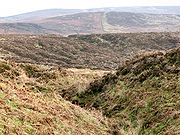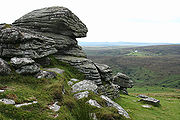
Warren House Inn
Encyclopedia
The Warren House Inn is a remote and isolated public house
in the heart of Dartmoor
, Devon
, England
. It is the highest pub in southern England
at 1,425 feet (434 m) above sea level
. It is located on an ancient road across the moor, about 2 miles (3 km) north east of the village of Postbridge
and has been a stopping point for travellers since the middle of the 18th century.
As Burnard said, the current building dates from 1845, but the original inn on the southern side of the packhorse track was probably built in the middle of the 18th century, certainly well before the turnpike road was created in 1792. There must have been sufficient packhorse and foot traffic because some time afterwards a small rabbit warren was established nearby to allow the inn to serve rabbit-pie with scrumpy. The earliest landlord recorded is William Tapper, in 1786.
 The newly rebuilt inn was first named The Moreton Inn and in 1850 it was owned by William Honey of Tavistock and the host was William Warne. Not long after, Jonas Coaker, the self-styled Dartmoor Poet who was born in Postbridge in 1801, became landlord and it was probably he who renamed the inn. In his day the inn was frequented by miners from the nearby Vitifer and Golden Dagger tin mines
The newly rebuilt inn was first named The Moreton Inn and in 1850 it was owned by William Honey of Tavistock and the host was William Warne. Not long after, Jonas Coaker, the self-styled Dartmoor Poet who was born in Postbridge in 1801, became landlord and it was probably he who renamed the inn. In his day the inn was frequented by miners from the nearby Vitifer and Golden Dagger tin mines
. Coaker later recounted two incidents that took place while he was landlord: in one he had to take to the moor when a crowd of miners helped themselves to his liquor; and on another occasion two miners got into a fight with a fatal result for one of them, but the survivor was let off with three weeks' imprisonment mostly on Coaker's evidence because he was able to show gross provocation.
 The Inn is the subject of much folklore - probably exaggerated over the generations. For example, one traveller is said to have stayed there overnight and found a body in a chest in his room. When he mentioned this to the landlord, he was told: "'tis only fayther! … the snaw being so thick, and making the roads so cledgey-like, when old fayther died, two weeks agon, we couldn't carry un to Tavistock to bury un; and so mother put un in the old box, and salted un in…"
The Inn is the subject of much folklore - probably exaggerated over the generations. For example, one traveller is said to have stayed there overnight and found a body in a chest in his room. When he mentioned this to the landlord, he was told: "'tis only fayther! … the snaw being so thick, and making the roads so cledgey-like, when old fayther died, two weeks agon, we couldn't carry un to Tavistock to bury un; and so mother put un in the old box, and salted un in…"
Another relates to a visitor who was persuaded to buy a flock of sheep, after consuming copious quantities of cider. The following morning he discovered that the "flock" that he’d been shown by the locals that night was actually the prehistoric stone circle
s of Grey Wethers
.
The fire in the hearth, it is rumoured, has never been allowed to go out and has itself become part of the folklore of the inn. It is said that when the inn was rebuilt, the glowing embers of the fire were carried across the road on a shovel to the new hearth.
Public house
A public house, informally known as a pub, is a drinking establishment fundamental to the culture of Britain, Ireland, Australia and New Zealand. There are approximately 53,500 public houses in the United Kingdom. This number has been declining every year, so that nearly half of the smaller...
in the heart of Dartmoor
Dartmoor
Dartmoor is an area of moorland in south Devon, England. Protected by National Park status, it covers .The granite upland dates from the Carboniferous period of geological history. The moorland is capped with many exposed granite hilltops known as tors, providing habitats for Dartmoor wildlife. The...
, Devon
Devon
Devon is a large county in southwestern England. The county is sometimes referred to as Devonshire, although the term is rarely used inside the county itself as the county has never been officially "shired", it often indicates a traditional or historical context.The county shares borders with...
, England
England
England is a country that is part of the United Kingdom. It shares land borders with Scotland to the north and Wales to the west; the Irish Sea is to the north west, the Celtic Sea to the south west, with the North Sea to the east and the English Channel to the south separating it from continental...
. It is the highest pub in southern England
Southern England
Southern England, the South and the South of England are imprecise terms used to refer to the southern counties of England bordering the English Midlands. It has a number of different interpretations of its geographic extents. The South is considered by many to be a cultural region with a distinct...
at 1,425 feet (434 m) above sea level
Above mean sea level
The term above mean sea level refers to the elevation or altitude of any object, relative to the average sea level datum. AMSL is used extensively in radio by engineers to determine the coverage area a station will be able to reach...
. It is located on an ancient road across the moor, about 2 miles (3 km) north east of the village of Postbridge
Postbridge, Devon
Postbridge is a hamlet in the heart of Dartmoor in the English county of Devon. It is situated on the B3212, roughly midway between Princetown and Moretonhampstead....
and has been a stopping point for travellers since the middle of the 18th century.
History
In 1905 Robert Burnard wrote: "When packhorses were used on the Moreton track, New House, or as it is now called, Warren House Inn, was on the right side of the road proceeding from Postbridge towards Moreton, and it is so shown on Donne's map. This old building was burnt down some years ago and was rebuilt in 1845 by J. Wills on the other side of the present road, here it here occupies the site of the ancient packhorse way."As Burnard said, the current building dates from 1845, but the original inn on the southern side of the packhorse track was probably built in the middle of the 18th century, certainly well before the turnpike road was created in 1792. There must have been sufficient packhorse and foot traffic because some time afterwards a small rabbit warren was established nearby to allow the inn to serve rabbit-pie with scrumpy. The earliest landlord recorded is William Tapper, in 1786.

Dartmoor tin-mining
The Dartmoor tin mining industry is thought to have originated in pre-Roman times, and continued right through to the 20th century. From the 12th century onwards tin mining was regulated by a Stannary Parliament which had its own laws....
. Coaker later recounted two incidents that took place while he was landlord: in one he had to take to the moor when a crowd of miners helped themselves to his liquor; and on another occasion two miners got into a fight with a fatal result for one of them, but the survivor was let off with three weeks' imprisonment mostly on Coaker's evidence because he was able to show gross provocation.
Folklore

Another relates to a visitor who was persuaded to buy a flock of sheep, after consuming copious quantities of cider. The following morning he discovered that the "flock" that he’d been shown by the locals that night was actually the prehistoric stone circle
Stone circle
A stone circle is a monument of standing stones arranged in a circle. Such monuments have been constructed across the world throughout history for many different reasons....
s of Grey Wethers
Grey Wethers
Grey Wethers consists of a pair of prehistoric stone circles, situated on grassy plateau to the north of Postbridge, Dartmoor, in the United Kingdom....
.
The fire in the hearth, it is rumoured, has never been allowed to go out and has itself become part of the folklore of the inn. It is said that when the inn was rebuilt, the glowing embers of the fire were carried across the road on a shovel to the new hearth.
Further reading
- The Warren House Inn, Dartmoor, by Tom Greeves and Elisabeth Stanbrook 2001 and 2004 ISBN 1 870083 40 7

